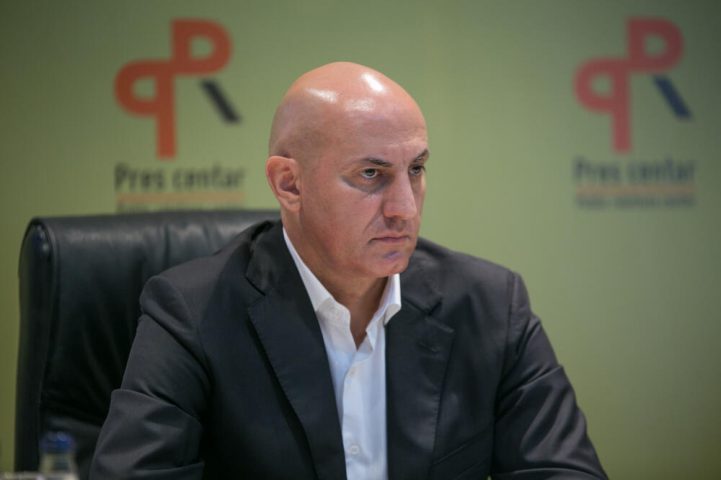WOMEN’S RIGHTS CENTER AND HUMAN RIGHTS ACTION CONDEMN OUTBURSTS OF HATRED AGAINST WOMEN IN POLITICS AND PROPOSE INTRODUCTION OF SEXUAL HARASSMENT AS CRIMINAL OFFENCE
26/04/2021
SIX YEARS LOST SINCE THE ADOPTION OF THE SUPREME STATE PROSECUTOR’S WAR CRIMES INVESTIGATION STRATEGY
08/05/2021GORAN DJUROVIĆ ILLEGALLY DISMISSED FROM THE COUNCIL OF THE RADIO AND TELEVISION OF MONTENEGRO – END OF MARATHON TRIAL

Photo: Vijesti
Former Parliament majority MPs from the Democratic Party of Socialists (DPS), Croatian Civic Initiative (CCI), Social Democrats Party (SD) and Bosniak Party (BP) breached the law by dismissing a member of the Council of Radio and Television of Montenegro (RTCG) Goran Djurovic in 2017, was finally determined by the court which annulled the decision of the Parliament.
The chamber of judges of the High Court in Podgorica, Nenad Otašević, Mirjana Vlahović and Dragiša Baletić, confirmed the judgment of the judge Radovan Vlaović of the Basic Court in Podgorica accepting Goran Djurovic’s lawsuit for the second time and annulling the decision of the Parliament of Montenegro on his dismissal.
The High Court finally determined what the Human Rights Action (HRA) had claimed for three and a half years, and that is that Djurović should not have been dismissed, because the reason for his dismissal had not been prescribed by the Law on the National Public Broadcaster of RTCG, which had been the only relevant law for the subject matter (lex specialis).
By the will of the then parliamentary majority, Djurovic was unable to perform his function in the RTCG Council, as well as all other public functions all those years during court proceedings. The Parliament cannot correct this intentional mistake in his case, but through improvement of written law, it should ensure that such cases do not repeat.
At the end of December 2017, Djurovic was dismissed from membership in the RTCG Council due to a misdemeanor from the Law on Prevention of Corruption, because he failed to report in due time that during his membership in the Council he had also been, for a while, the executive director of a private company engaged in agricultural production. Deputies of the ruling majority interpreted the violation as a conflict of interest, although the Agency for the Prevention of Corruption (APC) stated that the violation should not be interpreted as conflict of interest in the decision determining the breach of the obligation by Djurovic. He could have been made to pay a fine for the violation but it was no reason for dismissal from the Council under the law.
The Administrative Committee of the Parliament consisting of: Luiđ Škrelja, Marta Šćepanović, Milorad Vuletić, Branko Čavor, Ana Nikolić and Mihailo Anđušić from the DPS, and Adrijan Vuksanović from the CCI, unanimously adopted the draft decision on Djurović’s dismissal, which was only confirmed by the Parliament majority. They did so despite being presented with all the arguments, including the APC’s decision that there was no conflict of interest. Three members of this Committee were lawyers: Luiđ Škrelja, Marta Sćepanović and Milorad Vuletić.
Djurovic first initiated an administrative dispute in 2018, in which the Administrative Court declared itself incompetent, which was also confirmed by the Supreme Court. In the civil proceedings, which he initiated at the beginning of 2019, the judgments of the Basic court were twice revoked only due to the explanation of the jurisdiction of the basic court, under the influence of the controversial legal position of the Supreme Court from July 2019, signed by the then president Vesna Medenica. Before that, the president of the Democratic Party of Socialists (DPS) Milo Djukanovic stated that the regular courts did not have the right to quash.
The judge of the Basic Court in Podgorica, Radovan Vlaović, annulled the decision of the Assembly in February 2019, for the first time, but the verdict was revoked by the High Court, criticizing the way the judge explained his jurisdiction and referring to the controversial position of the Supreme Court.
In February 2019, the judge of the Basic Court in Podgorica, Radovan Vlaović, annulled the decision of the Parliament for the first time, but the verdict was quashed by the High Court, criticizing the way the judge explained his jurisdiction and referring to the controversial legal position of the Supreme Court. When in the renewed proceedings the same judge decided that his Basic court had not been competent to try the case, referring to the position of the Supreme Court’s position, the High Court also abolished that decision, explaining that the basic court did not explain well why it had not been competent. Finally, for the second time, the judge quashed the decision of the Parliament and explained the jurisdiction as requested by the High Court, and that decision has now been confirmed.
The High Court determined that the principled legal position of the Supreme Court does not refer to Djurović’s case, because the decision of the Parliament of Montenegro on his dismissal was made on the basis of legal, not constitutional powers of the Parliament. HRA believes that this position is a stunt, taken only so that the Supreme Court would not be offended. We note that based on this position, access to the regular court is still denied to other public officials, such as judges of the Constitutional Court, the Supreme State Prosecutor, etc. (for details see the Appendix).
In disputes still led by other civil activists who were also illegally dismissed by the Parliament from membership in state regulatory bodies, the judge of the Basic Court in Niksić, Sanja Nikić, issued two verdicts annulling the decisions of the Parliament on the dismissal of Nikola Vukčević from membership in the RTCG Council as well as the judge of the Basic Court in Podgorica, Branka Zeković, who annulled the decision of the Parliament on the dismissal of Vanja Ćalović Marković from membership in the Council of the Agency for the Prevention of Corruption. These judges persisted in providing judicial protection to persons whose rights were breached by acts of the Parliament, in a situation when the Administrative Court had already determined his incompetence for those disputes and when the Supreme Court affirmed it. We expect that the High Court, in the cases of Vukčević and Ćalović, will act the same as against Djurović and confirm the first instance verdicts in their favor.
It turns out that the legal protection against Parliament’s illegal decisions lasts for over three years in Montenegro. Such ineffective protection of rights is disastrous not only for individuals harmed by these decisions, but also for the lawful functioning of the state bodies they had been a part of. We especially point out that after the dismissal of Djurović and Vukčević from the RTCG Council, that council illegally dismissed the general director of RTCG Adrijana Kadija, and then the director of TVCG Vladan Mićunović was also illegally dismissed and the editorial policy was changed.
Ineffective legal protection presents an encouragement for any political majority to dismiss members of independent state bodies as they wish. HRA believes the Law on RTCG and other laws need to be amended to specify the jurisdiction of courts as well as urgency of resolving disputes regarding the election or dismissal of all public officials, noting the social significance of those procedures for lawful operation of state institutions.
“This is a particularly important judgment, because it concerns not only the protection of rights of one single person, but also the public interest for independent institutions and rule of law. In reality, Djurović was dismissed for his freedom of speech, because he criticized the government and was politically disliked by parliamentary majority as a member of the Council of public Radio and Television, while the alleged conflict of interest only served as a pretext. By fighting for his rights we have also won the right of regular courts to protect citizens from breaches of law by the Parliament. Now, the new political majority should show its democratic potential and by changing laws prevent further removals of persons from public functions before the court may verify legality of such decisions”, Tea Gorjanc Prelević, HRA executive director stated.
Legal representation for Goran Djurović from illegal dismissal was provided by the HRA thanks to the support of the Media Defense from London. His lawyer was Dalibor Tomović.
MORE DETAILS OF COURT PROCEEDINGS FOR THE PROTECTION OF THE RIGHTS OF GORAN DJUROVIĆ
On 16 January 2018, Djurović filed a lawsuit with the Administrative Court.
t the beginning of the litigation, in February 2019, judge Vlaović adopted the provisional measure and ordered the return of Djurović to the Council of the RTCG until the conclusion of proceedings. He thus made an effort to provide Djurović with effective judicial protection, in accordance with the law. However, the chamber of the Basic Court, composed of judges Simo Rašović, the presiding judge, Ana Delić and Milena Matović, as members of the chamber, revoked the measure ten days later, due to the fact that Djurović is a public official whose position is determined by a mandate, so he cannot be returned to the Council by a court decision, but only through the procedure provided by the Law on the National Public Broadcaster of RTCG. However, the Chamber did not dispute the jurisdiction of the basic court to act in the case.
By the verdict from 28 February 2019, judge Vlaović annulled the decision of the Parliament on dismissal as illegal, for the same reasons for which he did it now, in 2021, and he based his jurisdiction on Article 14 para. 2 of the Law on Courts, which states that the basic court is competent to decide when the jurisdiction of another court is not prescribed, bearing in mind that the Administrative Court has already declared itself incompetent with a reference to Art. 13 para. 2 of the Law on Administrative Procedure, which states that an administrative dispute cannot be conducted against an act “adopted in a matter in which the Parliament of Montenegro directly decides on the basis of constitutional powers…”.
This verdict was revoked by the High Court, under the influence of the controversial legal position of the Supreme Court, demanding from the Basic Court to explain its jurisdiction differently, i.e. to determine whether the decision on dismissal arose from the constitutional or legal powers of the Parliament. Judge Vlaović then, in the repeated procedure, referred to the Supreme Court’s controversial legal position and declared himself incompetent, but the judges of the High Court revoked that decision, explaining that they actually considered, and when they revoked the first instance decision, that the basic court was competent to examine the decisions made by the Parliament on the basis of legal powers, as in Djurović’s case, but they were not satisfied with the way in which Vlaović explained the jurisdiction.
In Djurović’s case, for the first time since the publication of the Supreme Court’s controversial legal position, the High Court gave the basic courts the right to resolve disputes against Parliament’s decisions, but based on the controversial interpretation that the Supreme Court’s position actually refers only to decisions made directly by the Parliament on the basis of constitutional powers and that in this case the decision was made indirectly on the basis of constitutional, and directly on the basis of legal powers.
This conclusion does not necessarily follow from the text of the principled position of the Supreme Court nor from the text of the cited provision of the Law on Administrative Procedure, in which, to some extent, this position is based, but represents a pragmatic maneuver in order to satisfy both the Supreme Court and justice for Djurović in the style “And the wolf is full and the sheep are numbered”. Nevertheless, this position of the High Court meant a product of civil proceedings for Djurović for as long as two years.
The interpretation of the judges of the High Court, which has now made a certain deviation from the principled legal position of the Supreme Court from 2019, would mean that neither the basic court nor the Administrative Court are competent for disputes over the election of judges of the Constitutional Court, the Supreme State Prosecutor and four members of the Judicial Council from the ranks of eminent lawyers, Protector of human rights and freedoms (Ombudsman), the Governor of the Central Bank and members of the Council of the Central Bank of Montenegro, the President and members of the Senate of the State Audit Institution, because in the opinion of the High Court, the Parliament conducts these lection directly on the basis of the Constitution (although the election procedure are also prescribed by special laws), while the Basic Court and the Administrative Court would be competent for the election of “and other holders of functions determined by law”, such as members of the RTCG Council, members of the Agency for Prevention of Corruption, members of the Council of the Electronic Media Agency, etc. However, that position of the High Court is not shared by the Administrative Court, which has already concluded that the Parliament conducts elections of “other holders of functions determined by law” on the basis of constitutional competencies, and that therefore, that court is not competent for them. This understanding of the Administrative Court was also confirmed by the Supreme Court.
The High Court in Podgorica has now accepted the interpretation of the jurisdiction of the Basic Court offered by Judge Vlaović for the first time, invoking on the Article 14, para. 2 of the Law on Courts, having in mind Art. 13, para. 2 of the Law on Administrative Procedure, and made a clear deviation from the principled legal position of the Supreme Court from 2019.
Judges Sanja Nikić in the case of Nikola Vukčević and Judge Branka Zeković in the case of Vanja Ćalović applied the same approach as Judge Vlaović. Judge Nikić has already passed two judgments in the same dispute, referring to Art. 14 of the Law on Courts, so the High Court must now decide on the merits of the subject and can no longer return the case for retrial.
In order to unify court practice and create legal certainty, we expect from the High Court in Podgorica to decide in the same way in the cases of Nikola Vukčević – dismissed member of the RTCG Council and Vanja Ćalović, member of the APC Council.
Tea Gorjanc Prelević and Dalibor Tomović





 English
English